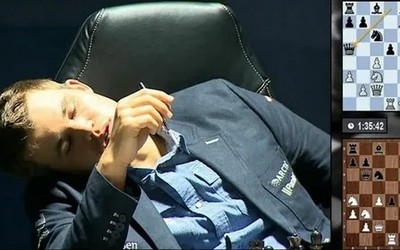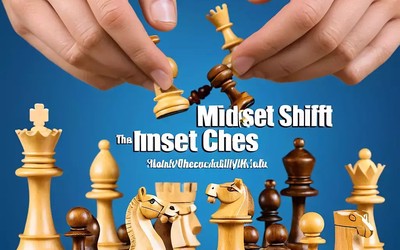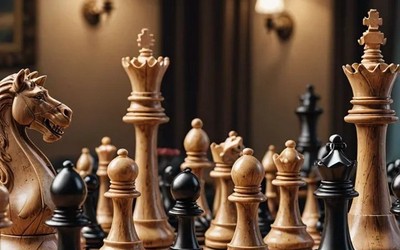
Improving Your Chess: Unlocking the Potential of Breaks and Rest
Improving Your Chess: Unlocking the Potential of Breaks and RestRest is often overlooked by chess players amidst struggles with tactics, opening memorization, and post-game analysis. However, its importance cannot be overstated. In this piece, I aim to highlight the significance of rest for both your well-being and improvement, along with strategies for effective rest.
Understanding the Power of Rest
Just as muscle growth primarily occurs during sleep rather than exercise, our brains also benefit significantly from rest. The National Institutes of Health in the U.S. underscore this, stating that sleep enhances memory consolidation and promotes creative thinking by linking new memories with existing ones.
While sleep is paramount, it's not the sole form of rest beneficial for chess players. There are four common ways to rest that you should incorporate into your routine:
- Take breaks during training sessions.
- Pause briefly during long games (Classical) or between games (Blitz/Rapid).
- Dedicate a full day of rest each week.
- Prioritize rest before and after tournaments to rejuvenate.
Below, I'll delve into why and how each of these forms of rest can lead to improved results and overall well-being.
Mastering Effective Breaks in Chess Training
The effectiveness of a prolonged study session in chess dwindles over time, leaving you depleted and unable to absorb new information. This inefficiency of time and energy underscores the importance of incorporating productive breaks into your training regimen.
Instead of enduring extended study periods, aim for focused sessions lasting 30 to 60 minutes, followed by a rejuvenating break of 5 to 15 minutes. This structured approach allows your brain to recharge, enabling another intensive and fruitful study session.
Personally, I've found success with a 45-minute work interval followed by a 15-minute break. Whether it's chess training, writing articles, or conducting lessons, this routine has yielded favorable results.
In instances where my students encounter obstacles in problem-solving, a brief pause often leads to breakthroughs upon resuming. The explanation lies in the refreshed state of the brain post-break, facilitating clearer thinking and improved problem-solving abilities.
To establish breaks as a regular practice, I advocate setting a timer to signal when it's time to pause. Consistency in this regard is key, at least until taking breaks becomes second nature.
Now, you might wonder, "What should I do during breaks?" The answer lies in minimizing cognitive engagement—allow your brain to digest the information without introducing new stimuli. Personally, I find stepping outside for fresh air, a short walk, and hydrating for the next session to be most beneficial. While tempting, activities like scrolling through social media or watching videos hinder full brain recharge and often lead to a disorganized and unfocused subsequent session.
Action Point 1: Incorporate Breaks During Training Implement focused training sessions lasting 30 to 60 minutes, followed by a 5 to 15-minute break. Utilize a timer to instill the habit of taking breaks regularly. During breaks, refrain from screen usage or any form of cognitive input. Engage in activities such as getting fresh air, visiting the bathroom, and preparing water for the subsequent session.
Resting During Gameplay: A Potential Game-Changer
The principle of taking breaks also applies to tournament games. Sitting at the board for over 3 hours without a break can increase the likelihood of making errors.
While it may not be feasible to take full 15-minute breaks during tournaments, even a brief interruption—such as standing up, taking a few steps, and hydrating—can help reinvigorate your focus. During tournaments, adrenaline can aid concentration.
When your opponent spends more than 5 minutes contemplating their move and you already anticipate their response, it's advisable to step away from the board.
Further calculations may yield diminishing returns, and taking a brief break can refresh your mind.
However, it's essential to utilize these breaks effectively. Many chess players are tempted to observe other games or discuss positions with friends during breaks, which can be enjoyable but not necessarily conducive to relaxation.
To optimize your tournament performance, refrain from scrutinizing other chess boards during short breaks. While it's not necessary to completely abstain from checking on friends' games, be mindful that it may not be the most beneficial use of your break time if you aim for positive results.
When engaging in longer online sessions or participating in over-the-board (OTB) Blitz or Rapid tournaments, it's crucial to intersperse breaks between rounds. Adhering to the same principles as before, excessive chess discussions with friends without allowing your brain time to unwind can gradually erode your focus throughout the day.
Ensure that you occasionally allocate time for a proper break by stepping outside and relishing the tranquility. While this may seem less appealing than socializing with friends, it proves effective in revitalizing your mental faculties.
Feel free to skip certain recommendations, but bear in mind that neglecting breaks will inevitably result in diminished focus later on.
Action Point 2: Rest During Games Take brief pauses whenever your opponent is contemplating their move, and you've already mapped out a response to their most logical play. Avoid inundating your mind with additional chess positions during breaks. When participating in multiple Blitz or Rapid games consecutively, schedule adequate breaks between rounds.
Embracing a Weekly Chess Sabbath: Harnessing the Power of Rest
In a compelling interview with Tim Ferriss, Joshua Waitzkin, a former chess prodigy, emphasized the importance of reaching a state of complete rest to achieve peak performance. Waitzkin's mastery of balancing rest and high-intensity activities is detailed in his remarkable book "The Art of Learning," which chronicles his journey to the top in chess and martial arts.
In today's society, taking a day off may be perceived as a sign of weakness. However, those who fail to prioritize rest often experience burnout prematurely. To succeed, it's essential to establish a consistent, sustainable routine—one that includes adequate rest.
Taking a rest day from your chess training offers three distinct benefits:
- Amplifies the intensity and motivation of the remaining six days.
- Reduces stress levels and alleviates the constant pressure to perform.
- Enhances your ability to focus and think clearly, particularly when it's most crucial.
Despite the simplicity of this advice, many of my students initially struggle to adhere to it. However, once they implement a weekly rest day, they often report remarkable improvements. They tend to perform exceptionally well on the day following their rest day, exhibit greater consistency in their training, and find it easier to push themselves knowing they have a designated day for complete recharge.
If you're genuinely committed to advancing your chess skills, incorporating a rest day is imperative. Now that I've hopefully convinced you, let's delve into what that entails.
A true rest day means abstaining from all chess-related activities. Some of my astute students attempt to take pseudo-rest days by engaging in activities such as revisiting past training materials or playing casual games. However, this approach usually proves counterproductive as it fails to provide the benefits of genuine rest while also falling short of effective training.
To truly reap the benefits of a rest day, refrain from all chess-related activities. Bid farewell to your Chessable streak, set aside chess books, and resist the temptation to watch grandmaster games. This will allow you to mentally recharge, setting the stage for more focused and meaningful training sessions in the ensuing six days.
Effective rest becomes even more critical before and after over-the-board (OTB) tournaments. Despite the common tendency to intensify training efforts in anticipation of tournaments, this often leads to burnout during the games—a scenario best avoided.
Action Point 3: Incorporate a Weekly Rest Day from Chess
- Schedule your rest day at the start of the week.
- Avoid the temptation to engage in semi-training on your rest day.
- Remember, to achieve peak performance, you must allow yourself to fully rest.
Action Point 4: Implement Pre and Post-Tournament Rest Days
- Avoid last-minute cramming before tournaments; prioritize rest and quality sleep instead.
- Consistently train in the months leading up to a tournament to build confidence and fitness.
- Embrace the mindset of an athlete, focusing on sleep, nutrition, and appropriate training intensity.
- Allow yourself time to rest after a tournament to recharge mentally and reflect on areas for improvement.
Final Thoughts: Embrace Rest for Chess Improvement Rest is crucial for peak performance in chess. Neglecting rest risks undermining your hard work and may lead to burnout. Schedule your first official rest day from chess and follow the action points to experience improved play, focus, and motivation.



